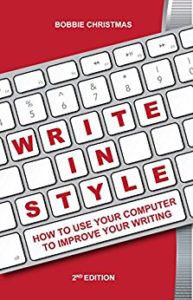 by Bobbie Christmas
by Bobbie Christmas
I devoted an entire chapter to my Bill of Writes for writers in my seven-award-winning book on creative writing titled Write In Style: How to Use Your Computer to Improve Your Writing. Special to WPN, I have agreed to list and explain each item. Below you’ll find numbers nine and ten in my Bill of Writes. For all twenty-one items, refer to Write In Style, published by BookLogix and available on Amazon.
You Have the Right To Spend Time “Doing Nothing”
Most of us know that the alpha state, the one in which we first fall asleep, is the one where inventors, songwriters, and writers access their most brilliant thoughts. I’ve heard that Thomas Edison took little naps during the day, and although he may not have known what to call his technique, he intentionally accessed his alpha state for solutions and new ideas.
Our brains are never quiet, but when our bodies are busy we cannot always hear what our brains have to say. To access your endless imagination, your inventive state, all you must do is “do nothing.” In that quiet state, you can hear your thoughts and tap into your creativity.
You may choose to take power naps of twenty minutes or less, as Edison did, or you may meditate, or you may simply sit still in a relaxed position and let your mind wander.
I meditate almost every day. Each morning before I get out of bed, I take a deep breath and let it out slowly, making the sound of “Ohmmmmm.” I continue deep breathing and sound repetition until my body relaxes. In a meditative state, I visualize the way I want my day to go, what I want to bring into my life, what I will achieve that day. I “see” myself accomplishing the tasks on my list. The few minutes of meditation allow me to plan my day and see it unfold the way I want. I love the joy of starting each day with a meditation before I stretch and get out of bed.
Almost every evening before I fall asleep, I meditate again, this time making the sound of “Ahhhh” when I exhale. Once in the meditative state, I give thanks for all the gifts and joys of the day, for all the loving people in my life, and for the privilege of doing what I love, to make my living.
True, I do not produce anything tangible during the times I “do nothing,” but I let my body relax so the brain can go out to play.
When I took a course in Silva Mind Development and Stress Control, I learned a different way to meditate, although deep breathing consistently appears to be part of any form of meditation. With Silva I learned to count backward to myself with each deep breath. “Ten, ten, ten.” Next breath: “Nine, nine, nine,” and so forth, until I reached one, by which time I achieved a meditative state.
However you go about it, intentionally reach the alpha state often, and your tension reduces and creativity increases, but meditation is not the only way to achieve the alpha state.
You can also sit and stare out a window or lean back in an easy chair and look at the ceiling. Your mind travels freely when your body relaxes. Don’t forget to keep paper and pen nearby to write down ideas, titles, dialogue, or other thoughts that come to you as you float through a delightful, restful alpha state.
You Have the Right To Take a Vacation From Writing–With a Predetermined Start and End Date
Treat writing as your career, even if it is part-time, because if you treat it as a hobby, it will remain one. Make no mistake about it; writing is work, even when it brings you joy. To refresh your mind and keep you in a creative state, you must take time off from your regular work, whatever it is, and you must take time off from writing too. Writing requires self-disciple, and it requires rest. Do not feel guilty when you take a vacation from writing, but do set a beginning date and an ending date for your holiday, and stick to it.
Writers may find themselves in family crises or other situations that distract them from writing. If something diverts your attention, set an end date for when your furlough from writing will end. Give yourself the hiatus you need. If, for example, you have a new baby, decide to return to your writing when the baby turns three months old.
We cannot predict the future, though. If your mother’s health has taken a downturn and she needs you by her side, you may not know how long you will be away from your writing. In such a case, set a situation-specific end date, such as this one: “When I am no longer needed to take care of Mother for three or more hours a day, I will return to my writing.” Such an end date allows for any turn that might take place, such as your parent going to a nursing home.
Allow yourself the freedom you need, so that writing does not become a chore. It should never be the thing you put off for all your other responsibilities. Writing IS a responsibility.
Bobbie Christmas is a book doctor with twenty-five years of experience and is the author of Write In Style: How to Use Your Computer to Improve Your Craft, winner of seven awards. Her website is www.zebraeditor.com.
